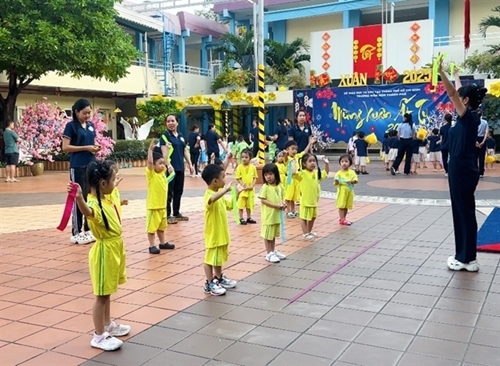The 2024-2025 academic year marks the second year that the city’s education sector has been implementing this model.
    |
 |
|
Students participating in outdoor activities at a kindergarten in District 3, Ho Chi Minh City (Photo: VNS) |
In October 2023, the city officially introduced the first-ever set of criteria for building happy schools nationwide.
According to the latest report by the city’s Department of Education and Training (DOET) reviewing one year of implementing the “Happy School” model in late last year, the “Happy School” criteria were designed with a total of 18 specific standards.
These standards are assessed based on surveys of how both teachers and students feel about their school.
They are divided into three main groups, including six related to human resources, eight to teaching and educational activities, and four to the school environment.
Each standard is evaluated at three levels: “needs improvement,” “fair,” or “good.”
The set of criteria applies to all educational institutions in the city, including kindergartens, primary schools, secondary schools, high schools, non-public schools, vocational centres, as well as colleges and intermediate schools that offer continuing education programmes at the high-school level.
Based on these criteria, each school management board and teaching council conducts a self-assessment of its performance.
Indicators that are already well met should be maintained, while those that have not been fulfilled require specific targets and strategies for improving service quality and performance levels.
Following the self-assessment, schools develop detailed guidelines for school leaders, teachers, staff and students to implement each part of the criteria, taking into account their own facilities, human resources, learning environment, educational level, and type of institution.
In the 2023-2024 academic year, 100% of educational institutions in the city began implementing the model to enhance teaching quality and improve student outcomes.
Moving forward, the “Happy School” criteria will continue to be refined and more closely aligned to the practical needs of each educational level, in keeping with the broader requirements for educational reform and societal realities.
According to DOET, building this model must stem from the school’s own motivation rather than a pursuit of accolades or achievements.
After more than a year of implementation, the model has begun to yield significant improvements in teaching and learning, strengthening connections among teachers, school administrators, students, and parents.
Amid the education sector’s efforts to reach the finish line in gradually rolling out the 2018 General Education Curriculum, the Happy School model provides a particularly meaningful boost to shifting the focus from knowledge transmission to the comprehensive development of students’ competencies and qualities.
The essence of the model revolves around three core values of love, safety, and respect.
Every stakeholder, from administrators, teachers, and students to parents, is encouraged to express their views and is given the opportunity to innovate and fully develop their potential.
Several examples of successful practices at schools in the city include integrating multiple subjects into project-based learning, combining experiential and career-oriented activities for secondary and high school students, regularly holding dialogue sessions between school administrators and students, and rolling out initiatives to create a greener, cleaner, and more beautiful campus environment.
Thanks to these efforts, learning spaces are continuously being improved in terms of both content and form, along with teaching methods and student assessment practices.
To further support schools in effectively implementing the “Happy School” criteria, the city’s education sector is partnering with universities, research institutes, and various organisations and individuals to host seminars that share best practices in handling pedagogical situations.
Experts and consultants are also invited to assist in identifying and resolving incidents of unethical or illegal behaviour among school administrators, teachers and staff.
These initial results from the city’s “Happy School” programme over the past year underscore the city’s pioneering and creative approach, particularly with the introduction of the “Happy School” criteria.
This effort reflects a high degree of responsibility, thorough planning, and dedication aimed at laying the foundation for a humane, progressive educational system.
Source: VNA